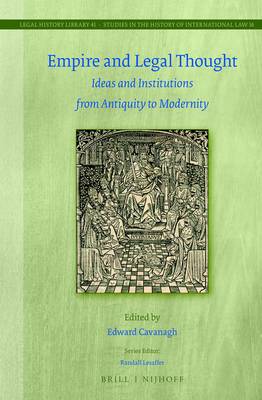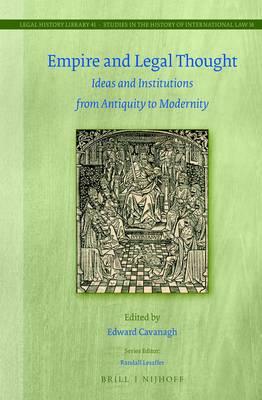
Je cadeautjes zeker op tijd in huis hebben voor de feestdagen? Kom langs in onze winkels en vind het perfecte geschenk!
- Afhalen na 1 uur in een winkel met voorraad
- Gratis thuislevering in België vanaf € 30
- Ruim aanbod met 7 miljoen producten
Je cadeautjes zeker op tijd in huis hebben voor de feestdagen? Kom langs in onze winkels en vind het perfecte geschenk!
- Afhalen na 1 uur in een winkel met voorraad
- Gratis thuislevering in België vanaf € 30
- Ruim aanbod met 7 miljoen producten
Zoeken
Empire and Legal Thought
Ideas and Institutions from Antiquity to Modernity
€ 357,45
+ 714 punten
Omschrijving
Emphatic of the importance of legal thought to the rise and fall of empires, this book highlights the centrality of empires to the development of legal thought.
Comprehension of the development of legal thought over time is necessary for any historical, philosophical, practical, or theoretical enquiry into the subject today, it is argued here. When seen against the background of broad geopolitical, diplomatic, administrative, intellectual, religious, and commercial changes, law begins to appear very resilient. It withstands the rise and fall of empires. It provides the framework for the establishment of new orders in the place of the old.
Today what analogies, principles, and authorities of law have survived these changes continue to inform much of the international legal tradition.
Contributors are: Clifford Ando, Lia Brazil, Joseph Canning, Edward Cavanagh, Zachary Chitwood, Emanuele Conte, Matthew Crow, Alberto Esu, Tiziana Faitini, Dante Fedele, Naveen Kanalu, Alexandre A. Loktionov, P. G. McHugh, Jordan Rudinsky, Mark Somos, Joshua Smeltzer, Lorenzo Veracini, Halcyon Weber, and Sarah Winter.
Comprehension of the development of legal thought over time is necessary for any historical, philosophical, practical, or theoretical enquiry into the subject today, it is argued here. When seen against the background of broad geopolitical, diplomatic, administrative, intellectual, religious, and commercial changes, law begins to appear very resilient. It withstands the rise and fall of empires. It provides the framework for the establishment of new orders in the place of the old.
Today what analogies, principles, and authorities of law have survived these changes continue to inform much of the international legal tradition.
Contributors are: Clifford Ando, Lia Brazil, Joseph Canning, Edward Cavanagh, Zachary Chitwood, Emanuele Conte, Matthew Crow, Alberto Esu, Tiziana Faitini, Dante Fedele, Naveen Kanalu, Alexandre A. Loktionov, P. G. McHugh, Jordan Rudinsky, Mark Somos, Joshua Smeltzer, Lorenzo Veracini, Halcyon Weber, and Sarah Winter.
Specificaties
Betrokkenen
- Uitgeverij:
Inhoud
- Aantal bladzijden:
- 634
- Taal:
- Engels
- Reeks:
- Reeksnummer:
- nr. 41
Eigenschappen
- Productcode (EAN):
- 9789004430983
- Verschijningsdatum:
- 28/05/2020
- Uitvoering:
- Hardcover
- Formaat:
- Genaaid
- Afmetingen:
- 155 mm x 236 mm
- Gewicht:
- 997 g

Alleen bij Standaard Boekhandel
+ 714 punten op je klantenkaart van Standaard Boekhandel
Beoordelingen
We publiceren alleen reviews die voldoen aan de voorwaarden voor reviews. Bekijk onze voorwaarden voor reviews.








